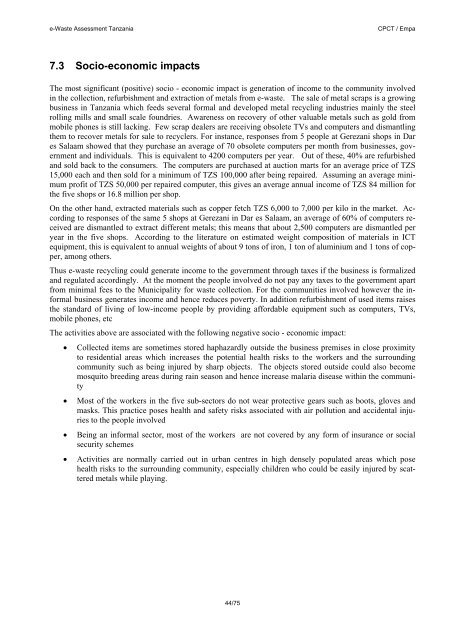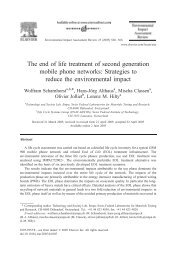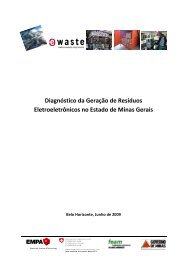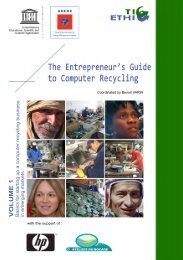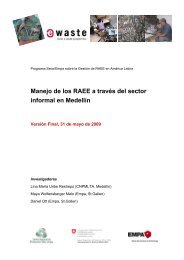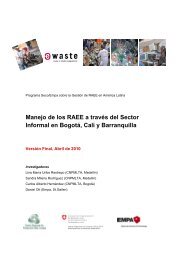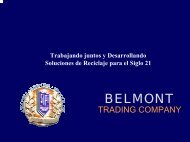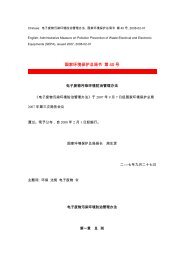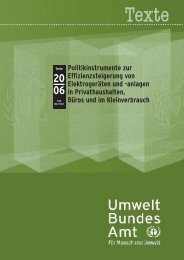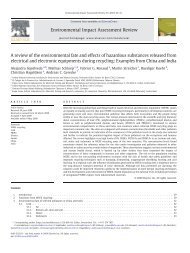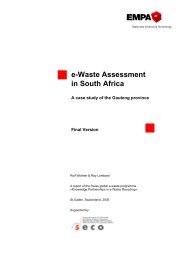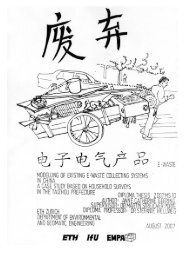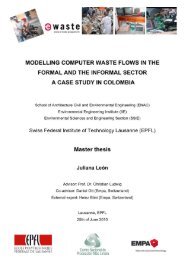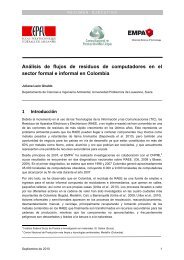e-Waste Assessment Tanzania - e-Waste. This guide
e-Waste Assessment Tanzania - e-Waste. This guide
e-Waste Assessment Tanzania - e-Waste. This guide
- No tags were found...
You also want an ePaper? Increase the reach of your titles
YUMPU automatically turns print PDFs into web optimized ePapers that Google loves.
e-<strong>Waste</strong> <strong>Assessment</strong> <strong>Tanzania</strong>CPCT / Empa7.3 Socio-economic impactsThe most significant (positive) socio - economic impact is generation of income to the community involvedin the collection, refurbishment and extraction of metals from e-waste. The sale of metal scraps is a growingbusiness in <strong>Tanzania</strong> which feeds several formal and developed metal recycling industries mainly the steelrolling mills and small scale foundries. Awareness on recovery of other valuable metals such as gold frommobile phones is still lacking. Few scrap dealers are receiving obsolete TVs and computers and dismantlingthem to recover metals for sale to recyclers. For instance, responses from 5 people at Gerezani shops in Dares Salaam showed that they purchase an average of 70 obsolete computers per month from businesses, governmentand individuals. <strong>This</strong> is equivalent to 4200 computers per year. Out of these, 40% are refurbishedand sold back to the consumers. The computers are purchased at auction marts for an average price of TZS15,000 each and then sold for a minimum of TZS 100,000 after being repaired. Assuming an average minimumprofit of TZS 50,000 per repaired computer, this gives an average annual income of TZS 84 million forthe five shops or 16.8 million per shop.On the other hand, extracted materials such as copper fetch TZS 6,000 to 7,000 per kilo in the market. Accordingto responses of the same 5 shops at Gerezani in Dar es Salaam, an average of 60% of computers receivedare dismantled to extract different metals; this means that about 2,500 computers are dismantled peryear in the five shops. According to the literature on estimated weight composition of materials in ICTequipment, this is equivalent to annual weights of about 9 tons of iron, 1 ton of aluminium and 1 tons of copper,among others.Thus e-waste recycling could generate income to the government through taxes if the business is formalizedand regulated accordingly. At the moment the people involved do not pay any taxes to the government apartfrom minimal fees to the Municipality for waste collection. For the communities involved however the informalbusiness generates income and hence reduces poverty. In addition refurbishment of used items raisesthe standard of living of low-income people by providing affordable equipment such as computers, TVs,mobile phones, etcThe activities above are associated with the following negative socio - economic impact:Collected items are sometimes stored haphazardly outside the business premises in close proximityto residential areas which increases the potential health risks to the workers and the surroundingcommunity such as being injured by sharp objects. The objects stored outside could also becomemosquito breeding areas during rain season and hence increase malaria disease within the communityMost of the workers in the five sub-sectors do not wear protective gears such as boots, gloves andmasks. <strong>This</strong> practice poses health and safety risks associated with air pollution and accidental injuriesto the people involvedBeing an informal sector, most of the workers are not covered by any form of insurance or socialsecurity schemesActivities are normally carried out in urban centres in high densely populated areas which posehealth risks to the surrounding community, especially children who could be easily injured by scatteredmetals while playing.44/75


